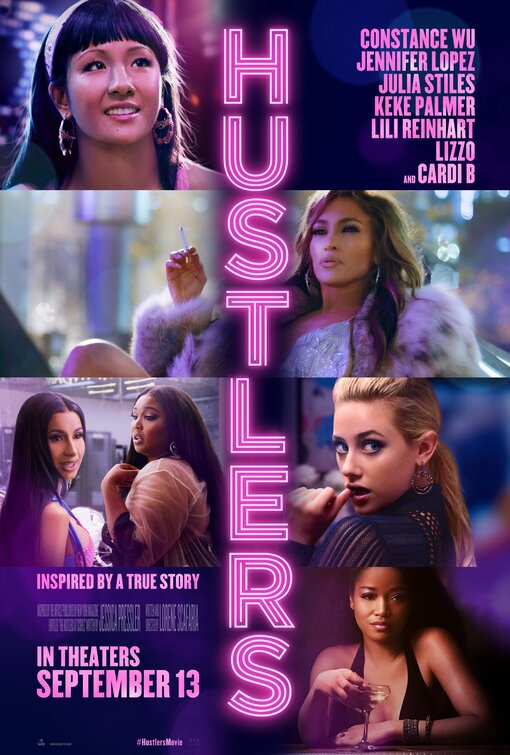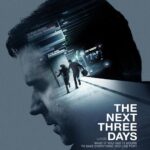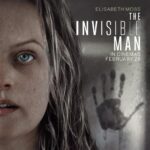Walk All Over Wall Street
Director
Lorene Scafaria
Starring
Constance Wu
Jennifer Lopez
Julia Stiles
When you mention Goodfellas in a review, it immediately puts a lot of backs up. Goodfellas is such a towering release that no imitator has ever really come close but Hustlers follows the path set out by Scorsese and strides so confidently down it that its missteps are forgivable. So when I say this film is Goodfellas-esque, in terms of story type, directorial style and character arcs, it’s not said lightly.
The narrative bounces back and forth between a journalist, Elizabeth [Stiles], interviewing ex-stripper Destiny [Wu] and the events being described, taking place before and after the 2008 financial crisis. Destiny reveals that in 2007 she took up work at a strip club, befriending the enigmatic and extremely successful dancer, Ramona [Lopez]. Together they make a ridiculous amount of money, feeding off the base desires of Wall Street bankers but once the crash happens, the big-spender clientele evaporates and the club devolves into a seedy unsafe environment. With the money running out and Destiny forced to raise her new-born child alone, Ramona introduces her to a scam wherein she sources previous regulars, drugs them and racks up an enormous credit card bill, assuming that no one would ever publically declare their actions.
One of the big takeaways from this release is that Scafaria is an incredibly capable director and certainly one to watch. The film opens by wonderfully illustrating the unglamorous reality of the industry which is then turned on its head with Jennifer Lopez’s intro scene doing the exact opposite and revelling in the hyper-sexuality of the stage. This successfully executed “have your cake and eat it” juxtaposition of expectation vs reality is impressive enough as it is but with genuinely spectacular direction, acting, editing and pacing, the whole feature is an incredibly impressive achievement and if we were grading this movie solely on its opening half, it would be contender for film of the year.
Another important aspect to cover is how this movie sounds. Obviously Hustlers will garner immense praise and attention for its overall look, with the production design, lavish costumes and atmospheric cinematography all worthy of merit, but the myriad novel sound design techniques are equally laudable. To my mind there are three notable examples of this, the first set during the framing device when Elizabeth presses Destiny for information and becoming cagey, she shuts off the recorder and walks to the door, instructing Elizabeth to leave. From the moment the recorder stops until the door slams shut, the film is silent and we do not hear the exchange. The second takes place when one of the strippers is wearing a wire for a police sting, the visuals carry on as normal while the audio feels like listening back to a single wireless body mic. And finally, and maybe most interestingly, this film is a fantastic example of music being used despite an absence of an original score. It’s commonly known that Tarantino does this all the time but the variety of genres involved (rather than a seemingly random, eclectic mix) is used to highlight the time period, the mood and signal what is next to come (i.e. everything a good score should do) while wisely avoiding songs featuring Jennifer Lopez, Cardi B or Lizzo that could distract from the story.
The other point of note for this film, other than how it looks and sounds, is the powerful central performances. There aren’t a great many examples of films with strippers as the main characters that doesn’t feel excessively exploitative or presenting the illusion of control and power while never delivering it. I believe part of that stems from the fact that these were films shot by men, whereas Hustlers presents two very real individuals at its core who are both incredibly powerful but also remarkably human. The supports, as strong as they are, admittedly fall away whenever Wu and Lopez are on-screen. The chemistry between them, the emotional stress and turmoil, the way they’ve been framed and shot, it’s a masterclass of visually establishing a character style and dynamic. From a male gaze, it’s difficult to not sound either lecherous or like I’m virtue signalling but the complexity and demand of these two performances is possibly career bests from both actors and wholly deserves all the accolades bestowed upon them.
But the film is far from perfect. It may be Goodfellas-esque but it’s no Goodfellas. For one thing, the entire middle section drags and introduces two heavily supporting roles quite late in the film’s runtime to the degree that they do not impact the story as heavily as they should. On top of that, the ending is fairly abrupt and a little unsatisfactory but being inspired by true events, the finale is often a problem for films of this nature. Having said that, the choice to close with the classic white text on a black background detailing “what happened next” doesn’t have the desired effect when you’ve had a framing device running throughout the movie set after said text. There are also examples of signposting and signalling that unfortunately went nowhere (I felt the character of Stephen was going to serve some sort of purpose but he did not) and Ramona goes from whip-smart savvy to making reckless stupid decisions but these are minor gripes and ultimately, the big flaw is that the third act can’t deliver on the promise of the first and second.
Much like Magic Mike, advertising for Hustlers has been flashy and playing heavily on the gaudy elements but the film itself is a nuanced, substantial character study with simple relatable drama and amazing tension that should be widely seen.
Release Date:
13 September 2019
The Scene To Look Out For:
When Destiny suggests changing the ratio of the drug they are slipping to their marks, we are treated to a very light-hearted sequence debating turning the power into a liquid or the liquid into a powder. The trials are silly and a little over the top, thanks to the accompanying piano, but perfectly illustrates the central friendship and offers the kind of bonding and absurd levity that sets it apart from the surprisingly similar Widows.
Notable Characters:
In the final act of the film there are a few too many undercooked characters. Dawn is a walking stereotype so is quite easy to understand but at the same time, she is also a bit of a cartoon character when compared to the grounded seriousness of Destiny and her constant back-and-forth struggles. While the performance itself can’t really be knocked and this isn’t a sole accusation, her presence added a little tonal instability and inconsistency that caused the whole final act to wobble.
Highlighted Quote:
“2007 was the fucking best. I made more money that year than a fucking brain surgeon”
In A Few Words:
“An entertaining and cathartic workplace dramedy headed by two incredibly solid central performances”
Total Score: 4/5
![The Red Right Hand Movie Reviews [Matthew Stogdon]](https://reviews.theredrighthand.co.uk/wp-content/uploads/2021/12/cropped-header1.png)




